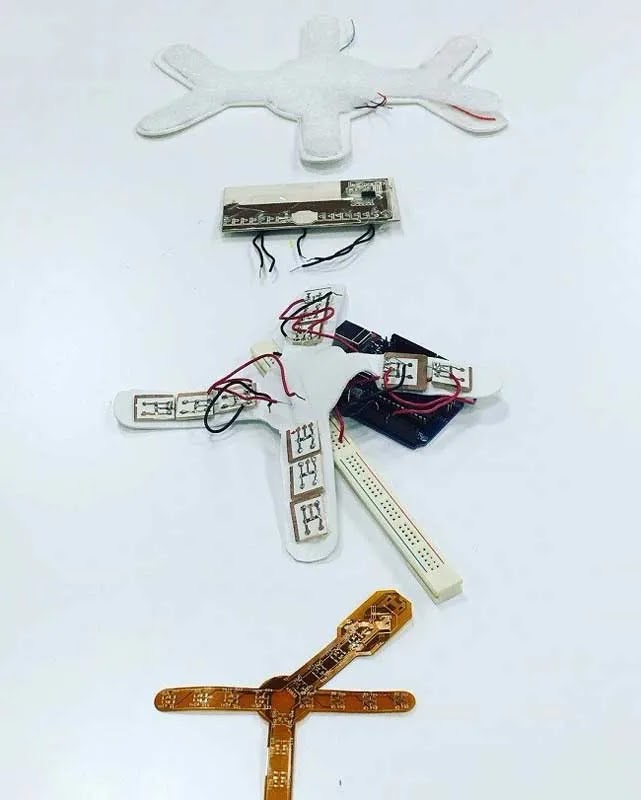 |
| Higia Technologies |
Early detection
and diagnosis of breast cancer will definitely increase the chances of recovery
and survival. Sometimes it is found after symptoms appear, but in many cases,
women with breast cancer do not show any symptoms.
Mexican student
Julian Rios Cantu,21, has reportedly developed a bra (in 2016) with
biosensors which can detect
signs/physical changes of breast cancer early enough that the chances of a full
recovery are far higher.
 |
| Julian Rios Cantú |
The
cancer-detecting bra, named "Eva Bra" is equipped with approximately
200 biosensors that would measure temperature changes, blood circulation to the
breast tissue and weight and shape of breasts, log them in an app and warn
users of any changes.
For example, if
the bra detects a higher temperature in the breast, it could imply this is due
to increased blood flow in the area, possibly because of a growing tumor.
Sensors then send the data via Bluetooth to a computer or smartphone app, where
it is analyzed.
'Breast cancer is the most frequent cancer among women,
impacting 2.1 million women each year and also causes the greatest number of
cancer-related deaths among women. It is the second most common type of cancer
in women. In 2018, it is estimated that 627,000 women died from breast cancer –
that is approximately 15% of all cancer deaths among women. While breast cancer
rates are higher among women in more developed regions, rates are increasing in
nearly every region globally'- WHO report.
Who inspired
Cantu to make smart "Eva Bra",
Top prize
winner of $20000 at Global Student Entrepreneur Awards(GSEA)winner Cantu's invention was inspired by his mother,
whose cancer resulted in a double mastectomy.
He was just 13,
when Cantu's mother was diagnosed with two bouts with breast cancer, then he
along with his three friends developed the Eva bra through his company HigiaTechnologies to help other women combat breast cancer.
This smart bra identifies cancer cells in their early stages.
In an interview
with TechCrunch, Julian says, “My mom is a two-time breast cancer survivor. The
first time she was diagnosed I was eight years old.”
“My mom could
have had a better outcome if she had been diagnosed earlier, but because of the
high density of her breasts, the X-ray missed the tumors,” he says.
 |
| 📷 julianrioscantu/Instagram |
It is during that time Julian realized how difficult it must be for women who are from developing countries of Mexico and don't have life insurance and that not mastectomy but death is the only outcome from them.
Cantú’s friend
Antonio Torres had also experienced his grandmother’s battle with breast
cancer, so Cantú began researching breast cancer and early detection. Armed
with information and an idea for new technology, Cantú invented EVA, a bra that
uses thermal technology to detect breast cancer.
"I realized the tremendous instability of the current methods of detecting breast cancer. Then I started investigating..."- Cantu told Infobae news media.
"Tumors surround themselves with blood vessels to obtain oxygen and nutrients in order to continue growing. As soon as there is a malformation of the breast or a tumor, there is an excess of vascularization, The greater the flow of blood, the higher the temperature."- he added.
In 2017, Julian
was awarded Mexico’s Presidential Medal for Science and Technology. It has also
been named one of “30 Most Promising Businesses of 2018” by Forbes Magazine
Mexico. They have also received a $120,000 investment from Y Combinator.
"devoted to boosting women's quality of life by attaining a professionalization of the self-exploration method for the early and effective detection of breast cancer".- company website.
Is the Eva Bra
clinically accurate?
According to a
report published in Parentology- More than 350 patients have undergone clinical
trials using the bra with an 81.7% specificity rate.
So far,
feedback to the EVA bra has been overwhelmingly positive. But, further testing
is required. The EVA bra is intended to serve as an early warning signal,
alerting women to the need for a health check.
To allow the bra
to gather data on a regular basis, the user will need to wear it for around 90
minutes every week. The bra has been used in clinical studies on over 350
patients, with an 81.7 percent specificity rate. Cantú says he just wants to
make sure no women suffer the way his mother did with a late-stage breast
cancer diagnosis.
Rios Cantu said EVA has many strategic partners ranging from enterprises, associations, private hospitals and public agencies such as the Mexican Institute of Social Security (IMSS).
Rios Cantu, founder of the company Higia Technologies, said-"in the coming years public institutions could distribute the devices to their patients."
In addition to Mexico, the smart bra is tested in other countries like Spain, Colombia, China and the United States, for its future commercialization.





.png)



0 Comments